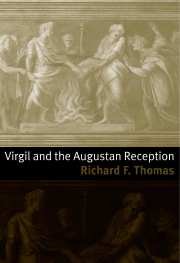Book contents
- Frontmatter
- Contents
- Acknowledgements
- Prologue
- Introduction: the critical landscape
- 1 Virgil and Augustus
- 2 Virgil and the poets: Horace, Ovid and Lucan
- 3 Other voices in Servius: schooldust of the ages
- 4 Dryden's Virgil and the politics of translation
- 5 Dido and her translators
- 6 Philology and textual cleansing
- 7 Virgil in a cold climate: fascist reception
- 8 Beyond the borders of Eboli: anti-fascist reception
- 9 Critical end games
- Bibliography
- Index
6 - Philology and textual cleansing
Published online by Cambridge University Press: 07 December 2009
- Frontmatter
- Contents
- Acknowledgements
- Prologue
- Introduction: the critical landscape
- 1 Virgil and Augustus
- 2 Virgil and the poets: Horace, Ovid and Lucan
- 3 Other voices in Servius: schooldust of the ages
- 4 Dryden's Virgil and the politics of translation
- 5 Dido and her translators
- 6 Philology and textual cleansing
- 7 Virgil in a cold climate: fascist reception
- 8 Beyond the borders of Eboli: anti-fascist reception
- 9 Critical end games
- Bibliography
- Index
Summary
usurers squeezing crab-lice, pandars to authority pets-de-loup, sitting on piles of stone books, obscuring the texts with philology, hiding them under their persons, the air without refuge of silence, the drift of lice, teething, and above it the mouthing of orators, the arse-belching of preachers.
EZRA POUND, Canto XIV, A Draft of XXX CantosThe Augustan Virgil, firmly established in the ancient, medieval and early modern reception of Virgil, was inherited by the nascent science of classical philology in the eighteenth and nineteenth centuries. In many ways the classical philologist is merely an updated Servius, and whatever the specialized title, grammarian, humanist, translator, textual critic or commentator, this figure has functioned as the agent in the assertion of the Augustan Virgil, confident in his ability to establish the true Virgil through the “objective” and “scientific” process of emendation. The hermeneutic circle is evidenced by universal faith in the validity of the “Servian default,” holding that the purpose of the Aeneid was “to imitate Homer and to praise Augustus through his ancestors.” The attitude spilled over into treatments of the Eclogues and Georgics. The mission of the editor followed as a necessary consequence of this condition, and its effects are still with us today, indeed they are resurgent, as we shall see. The Georgics must be made to celebrate the glory of toil, the Aeneid that of Augustus – anything that interferes with the clarity of such messages will need attention. The Augustan philologist proceeds on one of two fronts, though from a single base which may be articulated as follows: “It is Virgil's intention to have meant A; he therefore cannot have written B, which is at odds with A; he therefore must have written C. ”
- Type
- Chapter
- Information
- Virgil and the Augustan Reception , pp. 190 - 221Publisher: Cambridge University PressPrint publication year: 2001



